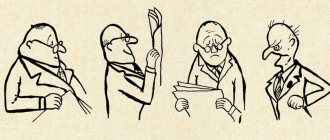Relationship
Each of us is concerned about the problem of mutual understanding with other people. I think that very often in life you have to deal with the fact that with some people you feel comfort, understanding and ease, but with others, on the contrary - irritation, misunderstanding and constant conflict situations. And the point is not that you are somehow “not like that” or “not like that.” Not at all! It is necessary to understand that we are simply all built differently. And socionics helped me understand many relationship issues at one time.
Of course, this is not a magic wand or a red pill that will tell you everything about relationships. For me, this is, first of all, an excellent tool for self-knowledge and understanding the nature of other people. At one time I was close to those people who said that opposites attract, then I thought that it was the other way around – people who are more similar. But in fact, everything turned out to be much deeper and more interesting. It turns out that each of us belongs to a certain psychotype with our own qualities, and there are as many as 16 of them. They are what we are talking about in socionics. But let's talk about everything in order!
What is socionics?
Socionics is the study of how a person perceives information about the world around him and interacts informationally with other people.
It was formulated back in the early 1970s by the Lithuanian sociologist and economist Ausra Augustinaviciute and described in his work “On the Dual Nature of Man” in 1980. The author tried to develop Carl Gustav Jung’s idea of mental types and combine it with the concept of information metabolism by Anton Kempelsky. Hence, many say that socionics was created at the intersection of psychology, sociology and computer science.
The subject of study in socionics is the process of exchanging information from the human psyche with the outside world, and its method is modeling the information system of the psyche. The role and status of socionics are completely ambiguous. Some people regard socionics as a separate science, while others consider it simply a part of psychology. For some it is a truism, for others it is pseudoscience. All this only says that socionics is only at the beginning of its formation.
It shows that each of us belongs to one of 16 psychological (socionic) types. I will talk about them in more detail later in the article. These types are named after the most famous literary and historical characters, which contributed to its popularization in its time. By the way, it is very similar to my favorite astrology. In my life, I use a combination of psychological socionics and esoteric astrology, which gives me a broader understanding of myself and the people around me.
Next, I will describe 3 main reasons why you should start studying socionics.
Helps you understand yourself better
Each of us, for a more harmonious life with ourselves and the world around us, must understand our potential, our weaknesses and strengths, all kinds of behavior options, and so on. A person who does not know himself has a very difficult time going through life. Moreover, he blames everyone and everything on the outside instead of looking inside, analyzing and realizing many things. And socionics, in some ways, helps to do this.
I am an introvert and I often need to be alone with myself in order to immerse myself in my inner world. To do this, firstly, I need my own personal space. And secondly, the time I can spend alone. This is how I recharge with energy, analyze some actions and events, and also develop new ideas. And for me all this is clear as a “clear day”, but friends and acquaintances regard my “withdrawals into myself” differently. Why do not you write?! Where did you disappear to?! Nowhere, I just want to be alone. Sometimes I feel even more comfortable this way than with anyone else. That's just my nature. Accept me for who I am...
Helps you find a life partner
Some fans of socionics are looking for life partners thanks to this direction. Now communities on social networks and socionic dating clubs are becoming widely popular, where people can find their soulmate. It is believed that those who are “duals” have the best chances, i.e. representatives of types that optimally complement each other. I am definitely for the use of socionics, but I am against fanaticism in any of its manifestations.
It is necessary to understand that in addition to socionic indicators in life there are many others, thanks to which people converge and build harmonious relationships. I can say unequivocally that living together will be very difficult for the rational and the irrational! This confirms both my experience and the experience of my friends. Knowing our similarities and differences, we can simply be more flexible in building relationships as a couple. The main thing is that this knowledge only helps, and does not say that if you are not a “dual”, then a relationship with you will definitely not work out.
Helps build team relationships
Socionics has proven itself well in business, team building and motivation. For the team to work successfully, it is necessary to distribute functional roles and job responsibilities in accordance with the real abilities and preferences of each member. Therefore, an approximate list of activities has been developed for each socionic type. Yes, it is conditional, but it still reflects general preferences and the range of possible tasks without any imposition.
As for me, my main incentive is interest in work. Research and analytical are the preferred areas of activity. I like it when I can apply systems analysis, build a classification, or develop a new concept. I love programming, writing and teaching. That is why I am writing this blog about self-development and developing the project for the harmonious development of personality “7 spheres of life”. All my qualities work well here: introversion, intuition, logic and rationalism.
How is a person’s sociotype determined?
There are tests for this (take it and find out who you are), but some people can determine their sociotype, given certain experience, by their appearance, as well as their manner of communicating, dressing, and reacting to the situation.
Pass the test quickly, but not very reliably. As a rule, online tests ask several questions, after which they determine whether you are, for example, an intuitive-logical introvert or whether your type is a logical-sensory introvert.
Having learned to identify 16 personality types of the people around you, you can understand what dictates their actions, what are the behavioral differences, and why their abilities, interests and habits differ.
Knowledge in the field of socionics will allow you to easily determine your compatibility with people of the opposite sex, imagine how future relationships with them will develop, what qualities in a partner, boyfriend or girlfriend should be perceived and which to ignore.
Typing by appearance is the most controversial option in socionics. There are supporters and opponents of this method. Signs may either not be visible, or formal signs may simply be absent.
Another method is self-typing, when you yourself try to determine from descriptions whether you are an intuitive-ethical introvert, for example, or a logical-intuitive introvert, etc. Some people believe that it is impossible to determine your sociotype. However, this is not entirely true.
It is quite possible to determine who you are, for example, an intuitive-ethical introvert or a logical-sensory introvert, etc. But before you define, you should begin to adequately perceive yourself, approach each trait of your character, not as bad, good, harmful or positive, but useful from the point of view of socionics. And, of course, it is necessary to understand in detail the typology of science according to Jung.
Read my book that will help you achieve happiness, success and wealth
1 unique personality development system
3 important questions for awareness
7 areas for creating a harmonious life
21 vectors for effective development
Read a book
If we look at these 3 reasons why it is worth studying socionics, we see that it helps to work out 3 vectors of the sphere of Relationships: Self, Family and Environment. And this is one of the most difficult areas of life, which you need to constantly work on. Therefore, you should make socionics your friend!
The influence of personality type on a person’s character
First of all, it is necessary to clarify that the psychotype does not completely determine a person’s character.
And if you have established as a result of tests that you are an intuitive-logical introvert, this does not mean that an intuitive-ethical introvert or a logical-intuitive introvert or other types do not manifest themselves in your character.
A psychotype is rather a way of perceiving information, reflecting how you react to a particular event in life, and how stable you are.
But each of us is unique, original. And 16 personality types are not able to fully describe any character and its individual parameters. The science of psychology, socionics or any other science about personality will never reach this point. We are too unique and diverse to drive ourselves into a certain framework of classification and typing.
Surprisingly, 16 personality types can be combined with each other, be harmonious and disharmonious. An intuitive-logical introvert can combine the features of a logical-intuitive introvert and a logical-sensory introvert.
Types according to Jung
Extrovert
Their energy and interest are directed outward, they are very sociable and have difficulty withstanding loneliness, from which they most often escape into any relationship. They are active, so much so that they can easily encourage others to take action, and easily adapt to changes and new conditions. They are risky and commit rash actions, under the influence of emotions or other people. Because they are impulsive, they are easy to manipulate. They rely on the opinions of others about themselves, since recognition and approval are very important.
Introvert
Their psychology is such that attention is directed deep into themselves, since they have a whole world inside that inspires and gives strength. Because of this, they prefer solitude, which makes them radically different from bright and noisy extroverts. Adapting to changes in the world can sometimes be very difficult, most often due to conservatism. Introverts are excellent conversationalists because they value quality over quantity. Able to concentrate on something for a long time and listen carefully.
Touch view
Loves numbers, facts and arguments. More inclined to do than to think, in other words - a practitioner. When communicating, I like to receive precise answers, on topic and briefly. Accordingly, he asks the same questions. Information is absorbed sequentially; it is difficult for such people to perceive it in general, so they first try to sort it into sections, without associations and impressions of the narrator. There may be difficulties with humor, because they understand everything literally, without revealing the veil.
Intuitive
He prefers fantasy to action, which is why he constantly thinks. Relies on the future, as a result of which it does not notice reality or does not attach importance to it. Captures connections between things that seem completely different and incoherent to others. Most often considered misunderstood by others.
Mental temperament
It is more characteristic of men who can be restrained, unperturbed and even under significant circumstances do not lose their composure. As a result, feelings are suppressed, or they are simply not given importance, because the most valuable thing is thinking and all sorts of intellectual formulas.
Sensing
Correspondingly, it is more characteristic of women who make some decisions based only on their feelings and the emotions of other people. Sometimes too subjective, but very responsive. Due to increased attention and interest in the lives of other people, they can cause hostility among other species.
Decisive
He definitely brings the job to the end, you can rely on him and trust him. It is very difficult to adapt to changes, and it is difficult to endure situations when you need to change your decision or rules. Organized, establishes order, because clarity is important. Able to plan and bear responsibility for decisions made.
Perceiver
Such people are very disorganized, the complete opposite of the previous option. Spontaneous and absent-minded. Life in uncertainty is a normal state of affairs for them. You should not expect them not only to fulfill their obligations, but also to recognize them. They open up best and show their best side if you allow them to work without preparation, impulsively and improvising.
Detailed description of ILE.
Tatiana PROKOFIEVA,Marina KUZMINA
From a series of articles “Psychology of the New Era”, published in the supplement to the newspaper “September 1” - “School Psychologist”, 2001.
We invite you, dear readers, to get to know socionic types better. Let’s take four functions for description: two strong and two weak. This way we can see both the advantages and disadvantages of each type.
Intuitive-logical extroverts (ILE, Don Quixote) are born researchers and inventors. At the same time, they study not only what is useful, but “everything that is interesting,” starting from the theory of machines and mechanisms, to butterflies and caterpillars. Don’t feed them bread, let them read about something mysterious and enigmatic. ILEs strive to immediately apply the acquired knowledge in practice, but at the same time they are rarely interested in receiving real benefits from their discoveries. Thanks to intuition (channel 1) and logic (channel 2), representatives of this type are able to quickly sift through a huge amount of literature on a topic that interests them, as they say, to embrace the immensity and “cut a clearing” for those following them. Their theories and methods are sometimes extraordinary in nature, which can lead to a revolution in already established views.
The main disadvantage of ILEs can be called their eternal desire to defend their ideals (the volitional sensory system is lame). Decency is the quality that ILEs idealize most. However, with inflated demands, it is very difficult for them to accept the lives and actions of people as they really are. Intransigence in the infringement of honor, dignity and freedom often pushes them into numerous “duels.” Sometimes they fight not with true enemies, but with windmills that operate only in their imagination. With the next insight, ILEs strive to share their thoughts with everyone around them, without even thinking, this corresponds to the moment and situation (weak function of ethics of relations). Unfortunately, they are not always able to listen to their interlocutor or opponent to the end, but interrupt them mid-sentence. For this they are sometimes called excessive upstarts.
The sensory-ethical introvert (SEI, Dumas) can be called a master of compromise. SEI's life credo is the ability to fully enjoy life and not interfere with others doing so. As a rule, representatives of this personality type have an extremely comfortable home in which they like to relax their soul and body (sensory perception is a basic function). There are many convenient things in the house. Everything is matched to the tone and thought out in advance. SEI spends his free time cooking - this is his favorite pastime. A representative of this type is a born designer, hairdresser and makeup artist. He has a keen sense of color, shape and volume of objects. Gathering friends at the dinner table, SEI often becomes the toastmaster, joker and soul of the party (the ethics of emotions are in the creative channel). With a funny story or tale, he is able to win over even the most gloomy person.
The disadvantage of SES is the lack of ability to make important, strategic decisions. He does not have tenacity, perseverance and foresight in responsible matters. SEI lives one day at a time, any conclusions for the future are especially painful for him (intuition of time and logic of actions are weak functions). Another negative trait has been repeatedly noticed in representatives of this type - they spend a lot of precious time on trifles.
Ethical-sensory extroverts (ESE, Hugo) are incorrigible optimists who try in everything and always to maintain presence of mind and good mood in any weather. These are true lovers of life, inclined to see the good in the bad. Representatives of this type love to eat delicious food and have a nice drink with friends in the lap of nature. They are often passionate about ideas. Unlike other personality types, ESEs are able to spend hours on the phone discussing the weather, business, and TV shows, or discussing other people’s problems. ESE is a lover of life and an optimist; he cannot stand despondency and inaction. They can provoke even the most gloomy and unsociable person to go mushroom picking. The joy of life is their main principle. ESE find themselves in the advertising business, they can “sell” the slowest-selling product or “spud” a picky buyer. At the same time, they often trade not for the sake of money, but for the sake of principle.
The disadvantage of ESE is the lack of accuracy. They are capable of being late and not doing what they promised on time, not at all because they didn’t want to, but because it is difficult for them to adequately make their plans. The weak function of logic does not allow representatives of this type to separate the main from the secondary. For him, all matters are equally important. As a result, scatteredness arises and important matters are left to chance. The weak function of intuition of time is expressed in the inability to foresee the future. To “crank out” the next little deal, ESE makes endless inquiries and makes numerous acquaintances. Sometimes irrepressible energy is spent on trifles, and when it comes to the main thing, there is no longer any strength or patience left to see it through to the end.
Detailed description of ESE.
The logical-intuitive introvert (LII, Robespierre) strives to see and create a system and pattern in everything. As a rule, these are widely erudite people who do not like to advertise their diverse knowledge. They are neat and pedantic not only in their way of thinking, but also in the external world around them. Among the LII, you are unlikely to meet a person who believes in miracles and hopes for “maybe.” Having identified a goal, they rely on their own hard work and organization in their affairs. Consistency, commitment, following a word once given - these are the good epithets that can be used to characterize representatives of this personality type.
The disadvantage of LII is the weakness of the ethics of relationships, which sometimes results in uncertainty and melancholy in people’s emotional assessments. This is especially noticeable in an unfamiliar environment. Looking at those around them, PIIs try to understand what is convenient, accepted in a given company, and what is not. However, they are not always able to adapt to the situation. They can be inappropriately cheerful or gloomy. Due to the lack of the ability to distinguish between emotional nuances, representatives of this type see people in black and white: bad - good, kind - evil, friend - enemy. LIIs are often characterized as stubborn and stubborn (hypertrophied volitional sensory function). The fact is that they cannot stand even the slightest falsehood and lies. In matters of fundamental importance to themselves, they can be overly solid, like a rock.
An ethical-intuitive extrovert (EIE, Hamlet) can be characterized as a person of wasteful emotions. It’s not for nothing that there are many artists, directors and musicians among them (the ethics of emotions in Channel One). “The whole world is a theater, and the people in it are actors” is the motto of EIE. He is able to present even uninteresting material to the audience in a surprisingly lively and entertaining way. In general, there is never a dull moment with them. Representatives of this type live from one emotional storm, which began unexpectedly, like a May thunderstorm, to another. He is a master at weaving quotes, jokes, puns and anecdotes into conversations. Often EIE is a true connoisseur and connoisseur of beauty. The intuition of time makes it possible to evaluate art and immediately determine what will be popular and what will not. Among representatives of this type there are many adherents of avant-garde movements in literature, music and painting. EIE is a bohemian man, sensitive to the mood of the era. These are the most aristocratic people, real princes and princesses.
The disadvantage of EIE is that it “works for the public.” Indifference and indifference to their posturing and external effects is sometimes too destructive. Not finding a suitable audience, EIE's enthusiasm fades, behavior becomes constrained and resentment towards listeners appears. They are distinguished by excessive disgust (the sensory system of sensations is lame). But even despite this, the home of a representative of this type is usually kept in “artistic disorder.” Contradictions can also appear in appearance. EIE is able to wear green and red, explaining this with fashion and a unique style. A painful inability to follow logic (this function is a pain point) sometimes hypertrophies into an emphasized desire to be known as a business person. EIE has a lot of notebooks, business cards and checks in his pockets. He presents them in all appropriate cases. A representative of this type cannot stand physical pain. Dentists are their sworn enemies. The slightest scratch can unsettle them for a long time, and a rich imagination ascribes to it the most dire consequences. Remember “The Princess and the Pea” - this is exactly the case.
Logical-sensory introverts (LSI, Maxim) prefer to act quietly, systematically and rationally. In their view, the world is organized according to the law of logic (the corresponding function is basic). These people respect discipline and order. They are adherents of strong power. The brightest representative of this type of personality can be called I.V. Stalin. In his politics, he preferred to act secretly, sometimes through intrigue, and eliminated competitors without “noise and dust.” The perseverance and patience of PWDs are envied by many personality types who do not possess these qualities. They retreat seeing the quiet but determined stance of the LSI. Logical-sensory introverts are leaders of a small team; they will cope with the assigned business or study task accurately and on time.
PWDs are often accused of being emotionally deaf. Their disadvantage is the weak manifestation of the ethics of emotions. For example, they are rarely able to sense the mood prevailing in the team under their supervision. They prefer to build relationships with people on the effect of adoration. Representatives of this type are rarely able to listen, and most importantly, accept even constructive criticism addressed to them. Their weakness in intuition of possibilities manifests itself in the fact that they tend to struggle with “excessive” information and try to adhere to one previously accepted opinion. Discussions and debates seem to them to be unnecessary bickering that interferes with work. PWDs rarely listen to advice because they consider their own point of view to be the only correct one. If you correctly point out these shortcomings to them, then they are able to harbor a grudge and, if necessary, take revenge. Just remember the Stalinist repressions, as a result of which dissident representatives of the intelligentsia were physically destroyed.
An intuitive-ethical introvert (IEI, Yesenin) can be described as a visionary and a dreamer. Memories of the future and thoughts about the past occupy IEI’s thoughts. Representatives of this type like to lie on the sofa with a book in their hands or go out of town and reunite with nature. True, nature is an insidious thing; it can present disasters in the form of snow, rain and wind. Therefore, IEI mainly conducts such events in its own imagination. Strong intuition of time (first channel) gives this type a penchant for mysticism and superstition. IEI believe in prophetic dreams and omens. The ethics of emotions (creative function) helps them adapt to the invisible feelings of the interlocutor, to grasp the subtle aspirations of someone else's soul.
Unfortunately, people are not always able to use their creative function for good. Sometimes there are IEIs with hypertrophied ethics of emotions, in other words, emotionally dissolute. Instead of warming with inner warmth, they begin to manipulate people and become capricious. In an exalted impulse, the IEI can throw a hysteria, because “everything is wrong” and “nothing is adding up” (sensory perception and logic of actions are weak functions). In a word, a representative of this type is not created for difficulties. Under the influence of the intuition of time, he is able to get bogged down in a world of illusions, dreams and fantasies. He is unlikely to bring a long-term business to its logical conclusion. IEIs can spend years renovating an apartment or, having started rearranging furniture in the morning, give up this activity by lunchtime.
Sensory-logical extroverts (SLE, Zhukov) do not have their head in the clouds and do not lie on the couch dreaming about what would happen if... These are people of earthly, practical affairs. Ambitious, strong-willed and purposeful - this is how representatives of this type can be characterized. They are born leaders and administrators who are able to take responsibility for making important decisions. They value logic and argumentation. The irrationality of SLE is manifested in the fact that their activities are sometimes subject to mood. If they haven’t gotten up “on their left foot” in the morning, then they are capable of signing any piece of paper or giving the coveted C grade to an inveterate truant, but if not, beware! They say about such people: they are tough to kill. Despite this, if you turn to representatives of this type for help in a critical situation, they will not rant and give free advice, but will prefer to help with action. This is their main advantage.
Disadvantages include the inability to foresee the future and the consequences of harsh words and actions (weak intuition of possibilities). As a result, it seems to them that problems come out of nowhere and grow like a snowball. They see their main task as being able to withstand and not break. SLEs are also unable to understand the intricacies of human relationships. Strong-willed sensory in this case, as it were, wedges weak functions and from the outside a “tank effect” is created. Like a battering ram, they go straight through people's opinions and weaknesses.
Sensory-ethical extroverts (SEE, Napoleon) are born leaders and leaders. Their area of interest: earthly, practical matters through which they can feel their boundless influence on others. Representatives of this type respect power and strive for it, and for one thing, for all the privileges bestowed by it. Their motto is “I came, I saw, I conquered”! These are strong-willed people (volitional sensory is a basic function) and at the same time diplomatic (ethics of relationships in the creative channel). While other types of information metabolism are characterized by hesitation and hesitation before embarking on a responsible event, SEEs rush headlong into the pool. “The main thing is to get involved in battle, and then we’ll see,” said Napoleon Bonaparte, a prominent representative of this type. “And I throw myself headlong into love, like into a pool,” echoes Alla Pugacheva, also a prominent representative of SEE. These are people of unbridled passions, if they are friends, then to the end, and if they love, then without a trace. They live in the present, for them the future is always wonderful, but it is in the future, and there is nothing to regret about the past, it cannot be returned.
The disadvantage of SEE is their desire to shine for everyone and everywhere like the Sun. The fourth channel (painful function) is occupied with the logic of relationships, they are not friends with the computer, they do not like various formalities: diagrams, schedules, they hate putting things in order. Hence their maximalism. Feelings of “love - hate” towards the same person can change several times a day. SEE often puts on the mask of a skilled manipulator and schemer, but due to the fact that intuition of possibilities is clearly not his strong point, quick victories sometimes turn into problems and defeats in the future. SEE hide failures from prying eyes, since nothing should disturb the image of the winner. SEE is often accused of egocentrism, inflated ambitions and conceit. Representatives of this type live one day at a time, according to the “here and now” principle, and with outbursts of anger, sometimes make enemies for themselves.
The intuitive-logical introvert (ILI, Balzac) can be called the main strategist of all strategists. The most powerful intuition, combined with logic, gives representatives of this type wisdom and knowledge of the laws of life. The hallmark of ILI is caution. A prominent representative of this type of information metabolism is M. I. Kutuzov. He fought all his life, but did not win a single significant battle, all his victories were ambiguous - with a draw. Despite this, we call him the greatest commander. And Napoleon and Suvorov called Mikhail Illarionovich nothing less than a sly fox. Why? Kutuzov's intelligence was manifested in the simple recognition of an obvious fact - it was impossible to defeat Napoleon in open battle. Napoleon was a master of attack, he thought through battle plans in advance and in detail, and Kutuzov knew how to retreat. This is the most difficult military task - acting with only part of the forces, it is necessary to restrain all the enemy’s forces, constantly alternating, either deploying them into a battle formation, or turning them into a marching one. Kutuzov accurately calculated that Napoleon would not be able to provide food for the cavalry horses, and he was right. At the end of the war, only 5,000 people remained alive from the great “Grand Army”. This is from five hundred or six hundred thousand! Kutuzov retained half of the army for a general battle.
The main disadvantage of ILI can be called a painful inability to actively show emotions. Just remember the historical fact of Kutuzov eating chicken at the height of the Battle of Borodino. Representatives of this type often give the impression of gloomy and sad people. However, under the mask of eternal skeptics and pessimists hides a true dreamer and idealist. In order not to seem like a “mean knight” OR capable of extravagance or reckless actions. For example, giving an expensive gift to someone you don’t know well. But even here they rarely spend all the money until the end; they rather calculate in advance how much they need to spend and when to call it a day. Weak sensory perception manifests itself in indifference to appearance, sometimes reaching the point of laxity and sloppiness. In general, they gravitate towards a simple style of clothing.
Logical-intuitive extroverts (LIE, Jack London) are born entrepreneurs, businessmen, and innovators. All of them can be described in one word – hard workers. However, they do not like meaningless activities; everything must have an end goal. The head of the LIE resembles a computer (a strong logic channel). They are able to quickly grasp the essence of the problem, calculate the details and calculate the optimal ways to solve the problem (manifestations of intuition). At the same time, representatives of this type are incorrigible romantics, prone to travel, adventure and risk. Among them there are many stuntmen, rescuers, and testers. They work easily and cheerfully; a sense of community and camaraderie is important to them.
The main problem of LIE is its appearance (sensory perception is poor). Therefore, they often look as if they have just come from a hike: the men are not shaved, the women are not combed. They have so many important things to do that they have absolutely no time to take care of themselves. The same applies to the problem of cooking. In the kitchen, representatives of this type do not like improvisation. Rather, they will take a cookbook and prepare a dish according to the written recipe. When asked a routine question about health, they may begin to describe dubious symptoms that they have recently experienced. A peculiar spontaneity in the manifestation of emotions (weak ethics of emotions) is comparable to an unexpectedly collapsed waterfall. At such moments there are “too many of them for others.”
An ethical-sensory introvert (ESI, Dreiser) is a true stoic and guardian of the moral principles of society. Among representatives of this type there are many lawyers, investigators, doctors and educators (ethics of relations in the first channel). ESI women are distinguished by their deep attachment to family. Having shouldered an unbearable burden in the form of work, housekeeping and children, they do not complain about fate, but heroically endure the hardships. In terms of the degree of dedication and reliability, no other psychological type can compare with ESI (volitional sensory - creative function). The ESI type knows how to be a healer not only of the spirit, but also of the body. The fight against evil is a distinctive feature of this type.
The disadvantage of ESI lies in the hyper-rationality of this type. A certain orthodoxy and maximalism negatively distinguishes them. Let us recall numerous ancient Greek stories. What should the main character choose: love or duty? ESIs choose the latter. Making such a choice, they often become hostage to internal loneliness. Interesting people and relationships that do not fit into their value system fall out of their sight. Representatives of this type are at odds with the intuition of possibilities, and therefore are capable of showing untimely or inappropriate initiative. Subsequently, this turns into numerous troubles - “the initiative is punishable.”
The logical-sensory extrovert (LSE, Stirlitz) is distinguished by the ability to separate the main from the secondary. Like all logicians, this type does not tolerate haste, fuss and the accompanying nervousness. LSE are businesslike, collected, consistent. In general, representatives of this type sensibly assess their own strengths, so they strive to occupy a niche that suits them in their work. Sensory senses in the creative channel give LSE refined taste and the ability to create beauty with his own hands. LSE women prefer eye-catching, figure-suiting styles and accessories in clothing. Beauty combined with functionality and usefulness is the key to their success.
A disadvantage of FELs is their excessive tendency towards predictability and stability (weak intuition of time). For their fear of living one day at a time, they are reproached for conservatism and short-sightedness. Weak ethics of emotions gives uncertainty in an unfamiliar environment. Despite the fact that LSEs are extroverts, they are not inclined to start new relationships, guided by the principle “an old friend is better than two new ones.” Even if family life is not satisfactory for some reason, LSE is unlikely to embark on a lonely voyage.
For an ethical-intuitive introvert (EII, Dostoevsky), issues of human ethics and morality come first in the hierarchy of priorities (ethics of relationships is a basic function). All his work is filled with the search for new, more perfect forms of human relationships. EII tries to be attentive to each individual, since he sees it as a whole world, a vessel in which, along with beauty, rudeness, anger and hatred are contained. The EII type is a spiritual and moral shepherd, a mentor, regardless of age. People rush to him to “cry into their vest” when grief happens or cats scratch at their souls. Making the path from understanding to forgiveness, the EII representative fulfills his destiny.
The disadvantages of the EII type include insufficient manifestation of volitional sensory skills, expressed in intransigence to violence against the individual. Moreover, their favorite expressions are all the epithets of “should”. The result is unnecessary fuss where there shouldn't be any. Spending days on end in philosophical reflections, which sometimes have no concrete, earthly application, EII is not able to organize his own life. External force pressure is detrimental to a vulnerable EII, unable to withstand the onslaught. Representatives of this type defend high, spiritual ideals, while rejecting and criticizing “philistine” manifestations: the desire to dress well, eat deliciously. EII sacrifice can sometimes be directed at those who do not really need it.
Vivid quotes from a representative of the type based on the results of using the projective technique “You have become a king in the magic kingdom”
Sensory-logical introverts (SLI, Gaben) are people who prefer to have a bird in their hands than to spend years catching a pie in the sky. A strong sensory function gives the SLI talent in everything related to working with his hands. A distinctive feature of this type is the arrangement of their own life. These people know a lot about design, furniture and have excellent taste. They prefer expensive clothes that emphasize their respectable status. And their status is really high. Both men and women are capable of organizing a profitable business in trade or production. SLIs are also natural cooks. The process of cooking for them is akin to a sacred rite. A strong sensory function helps them in this. And even if they don’t have a villa in the Canary Islands, but have a small house in the nearest Moscow region, believe me, they will be able to enjoy the delights of a morning jog in the dew, the smell of blooming lilacs and a mug of fresh milk.
The disadvantage of SLI lies in the weak functions of the ethics of emotions and intuition of time. Like ILI, SLI has difficulty expressing feelings and emotions. Latently afraid of being misunderstood (SLI are very vulnerable), he prefers not to demonstrate his true attitude towards people at all. However, if they are humiliated or publicly ridiculed, they can burst into tears and break down, shouting at the offender. Representatives of this type remember even minor grievances, and after major disagreements they are able to completely break off relationships for the rest of their lives. SLI's weak intuition of time manifests itself in the desire to plan all sorts of things in advance. This includes their excessive conservatism and caution. They will never make a final decision without fully understanding the issue and taking into account all the details.
Intuitive-ethical extroverts (IEE, Huxley) are born psychologists, consultants and mediators. Representatives of this type are the most lively, spontaneous people of all. Intuition in the first channel gives them the opportunity to immediately grasp the essence of human problems and desires. They think in a non-trivial, unusual way and sometimes discover unknown virtues and talents in their interlocutor. Among the IEE there are many inventors and pioneers in the field of computer programs and technology. Intuition combined with ethics manifests itself in a precious sense of tact. I would like to say separately about IEE’s talent in working with people. All representatives of this type are immediately charming, warm and attentive. They have many diverse friends and at the same time everyone loves them for their subtle understanding of human problems and characteristics. If you meet a person on your way who is capable of maintaining good relationships with ex-wives, husbands and work colleagues, then this is most likely an IEE.
The disadvantage of IEE can be called the inability to do work that requires painstaking, systematic work, in a word, any “sedentary work”. Representatives of this type take a long time to submit their thesis, quarterly reports, and any other important documentation (they lack the manifestation of volitional sensory skills). Peacefulness and friendliness sometimes plays a cruel joke in the life of IEE. True, sometimes (most often inappropriately) they are able to show an iron will and determination to go to the end. But then they regret harsh words and actions and look for opportunities for reconciliation.
Bibliography:
A. Barsova. How to live your own life, not someone else’s, or personality typology. – M.: “AST-press”, 2001.
S. E. Kashnitsky. Among people. Socionics is the science of communication. – M.: “Armada-press”, 2001
Social commentary Cackle











